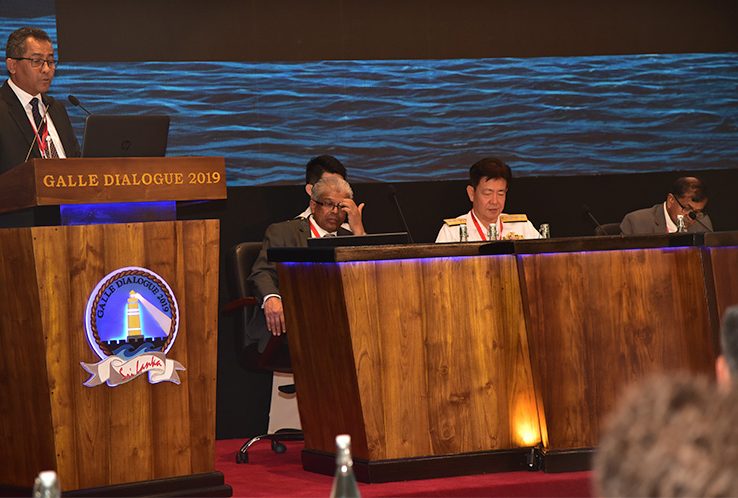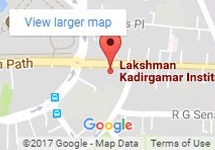
Reading Time: 2 min read
Dr. Ganeshan Wignaraja, Executive Director at the Lakshman Kadirgamar Institute of International Relations and Strategic Studies (LKI), was an invited moderator on a panel of experts titled ‘Shipping and Economy’ at the prestigious Galle Dialogue 2019, organised by the Sri Lanka Navy.
The panellists were Rear Admiral Akira Saito, Director-General, Operations and Plans Department (N3/N5), Maritime Staff Office, Japan Maritime Self-Defense Force (JMSDF); Captain Athula Hewavitharana, Managing Director, Sri Lanka Ports Authority; and Mr. Iqram Cuttilan, Chairman of the Ceylon Association of Shipping Agents (CASA).
The presentations and discussion underlined that the Indian Ocean is a crucial artery of global goods and energy trade with shipping powering economic growth. For instance, in the 28 economies that makeup the Indian Ocean economy, the container traffic growth elasticity was 2.1 before the global financial crisis. This means that annually container traffic grew twice as fast as the GDP growth in the Indian Ocean in the period 2001-2008.
However, the region’s container traffic growth elasticity has slipped to one since the crisis. This means that annually container traffic has slowed to the same rate as GDP growth in 2011-2018. A shipping slowdown—party driven by trade tensions, a slowing Chinese economy, and risk aversion with emerging markets—has profound implications for the littoral states of the Indian Ocean. In addition, India’s USD 50 billion port development strategy, Sagarmala, could increase competition within the region, especially for the Colombo Port.
It is, therefore, imperative for Sri Lanka to develop complementaries that will enable Colombo to maintain its competitiveness as a regional transshipment hub. A dialogue on achieving complementaries between the key players in transshipment is crucial. Sri Lanka should also look at investing in infrastructure and cutting red tape to realise the country’s vision of becoming a stronger transshipment hub.
Furthermore, a rising trend in maritime security threats should be mitigated. Annual drug seizes in the Indian Ocean as a whole have tripled over the last few years which may be indicative of a rising trend in maritime crime across the region. Piracy and unregulated and illegal fishing are other concerns. Modern crime-fighting methods, intelligence sharing, and closer cooperation among navies are important ways forward.
Major uses of the Indian Ocean like Japan play a useful role in the regional cooperation efforts by keeping the sea lines of communications (SLOCs) open, thereby ensuring freedom of navigation in the Indian Ocean. Japan will continue to maintain and promote maritime order in the region in close cooperation with partner navies.
The two-day international maritime conference organised by the Sri Lanka Navy under the patronage of the Ministry of Defence, was held on 21-22 October 2019. This annual event is aimed at strengthening regional maritime cooperation and formulating a global strategy to face common challenges in the maritime domain. This year the conference was held under the theme ‘Refining Mindset to Address Transnational Maritime Threats: A Review of the Decade,’ and brought together representatives of the Navy, public and private sector, as well as local and international experts representing 55 countries, 12 international organisations, and three defence industries.
The State Minister of Defence, Hon. Ruwan Wijewardene was the Chief Guest, and the opening remarks were delivered by the Commander of the Sri Lanka Navy, Vice Admiral Piyal De Silva. The State Minister of Defence delivered the keynote address at the inaugural session.



